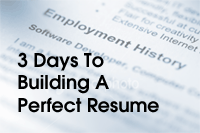Sell Yourself With Business Benefits (And Not Geek Speak)
Filed Under 3 Days To Building A Perfect Resume

This is Part #1 of the 3 Days To Building A Perfect Resume series.
One of the biggest mistakes I see in developers’ resumes is that fact that they get very granular in the details of their experiences. As I have said before, people think in terms of benefits over features. As a result, most developer resumes connect with developers, but create a very large disconnect with management.
Putting to much emphasis on technical terms and scenarios is just another form of dangerous geek speak. Some (but not all) developers do not attempt to “wow” the manager types by showing them benefits at their level, they instead attempt to “overrun” them with jargon thus thinking it will convince them that they are very experienced and the best logical choice. The opposite is actually true, managers will FUD on you and probably decide that (although technical) you are not what they are looking for.
In order to help interviewing managers connect the dots, work on a resume that outlines the diverse BENEFITS of the projects and people you have worked with, rather than the SPECIFICS.
What am I trying to say? Remember the styrofoam cup rant? People have never been interested in features (whether bullet points on a software box or on your resume), people are only interested in the benefits that those features bring.
The real “trick” is to write down your experience in ways that allow people to imagine what it would be like if they received those benefits and results. For example:
Common Resume Mistake:
- Built a ASP.NET CMS system for a high profile company that used it to monitor blood pressure machines. The client was very happy as it did 1 million transactions a day via AJAX.
- Managed a 100 person team dealing with C++ integration points to 3rd party products.
Result/Benefit Resume:
- Developed systems that significantly lowered the clients operating costs by maximizing the number of daily sales transactions
- Managed a large (100+) team that created a number of product opportunities and business partnerships by integrating with 3rd party applications and platforms.
Now which resume do you think will impress a manager? By presenting yourself as already solving problems that businesses continually improve on (i.e. increase sales, decrease operating costs, product development, etc…), the potential employer does not have to bridge the gap between your skills and the bottom-line benefits they will bring.
This simple resume tweak will take you from “AJAX blood pressure man” to “Team leader that can provide business opportunities”. Guess which one I would rather be…



